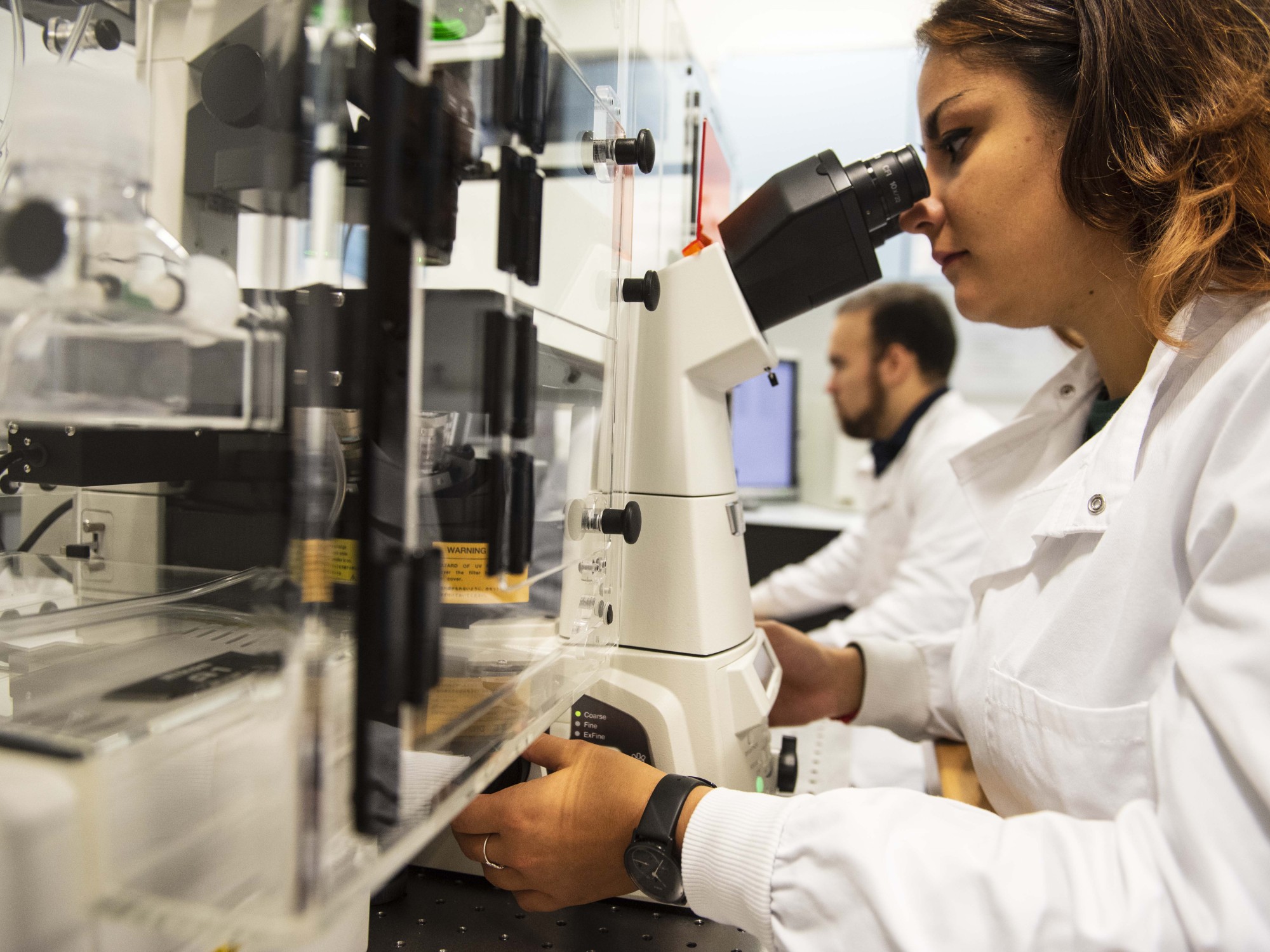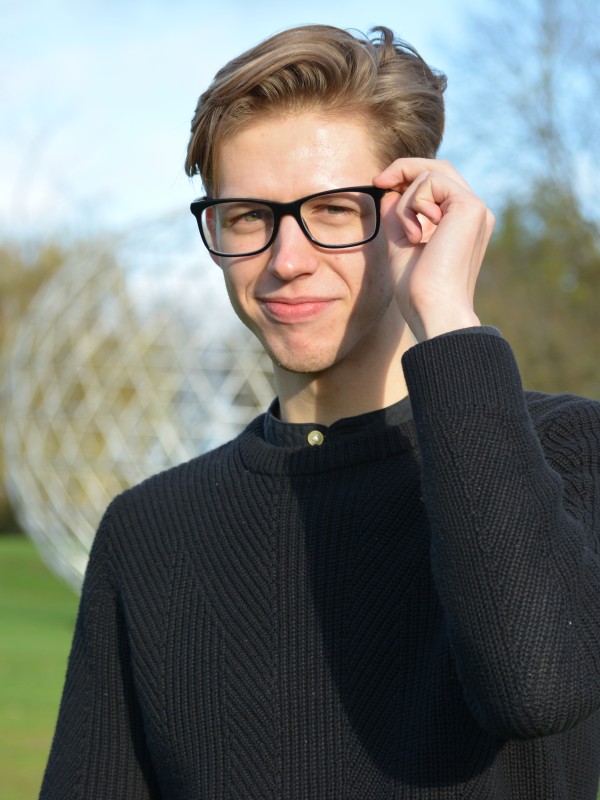
- Quantum Biology
PhD Quantum Biology
Our Quantum Biology PhD programme offers a unique opportunity to explore the fascinating interface between quantum physics and biology, with the potential to uncover new insights into the fundamental principles of life and advance technologies in fields such as medicine, biotechnology, and beyond.
Why choose this
programme?
- Contribute to an emerging and exciting discipline, that could hold the key to new approaches in solar energy, drugs and diagnostics, and even improve our understanding of how the brain works and the conceptual foundations of quantum theory
- Carry out research using our advanced spectroscopy, ion beam proton irradiation, nanotechnology and mass spectrometry facilities within our Advanced Technology Institute, plus additional facilities at our partner institute, the National Physical Laboratory
- Join the Leverhulme Doctoral Training Centre for Quantum Biology – the first centre of its kind in the world.
What you will study
Our Quantum Biology PhD gives you the opportunity to undertake an interdisciplinary research programme in a theoretical or experimental area of the discipline.
Depending on the availability of studentships, you could explore a topic such as:
- Photosynthesis
- Molecular mechanisms of mutation
- Enzymes
- Olfaction
- Nanobiotechnology
- Synthetic biology
- Spin chemistry and biology.
As a PhD student, you’ll become part of Surrey’s QB-DTC, putting you at the heart of a community of academics, postdoctoral researchers and guest scientists. In the first year, you’ll embark on a training programme of interdisciplinary seminars. These workshops are designed to ‘fill in the gaps’ in physics for biologists and in biology for students from a physical science or mathematics background.
Assessment
Your final assessment will be based on the presentation of your research in a written thesis, which will be discussed in a viva examination with at least two examiners. You have the option of preparing your thesis as a monograph (one large volume in chapter form) or in publication format (including chapters written for publication), subject to the approval of your supervisors.
After your first 12 months, you’ll complete a confirmation report, which will be assessed by independent examiners.
Location
This course is based at Stag Hill campus. Stag Hill is the University's main campus and where the majority of our courses are taught.
Research themes
Our research spans a wide range of biological systems and processes, including:
- Photosynthesis
- Spin chemistry in biology
- Molecular mechanisms of mutation
- Enzymes
- Olfaction
- Nanobiotechnology
- Synthetic biology
- Magnetoreception
- Neurobiology
- The role of noise in quantum biology
- Open quantum systems
- Quantum information theory
- Quantum computing.
Research centres and groups
You’ll be co-supervised by academics who are experts in their areas of research. Your supervisors will be from a range of schools and departments at the University, including the School of Mathematics and Physics, the School of Chemistry and Chemical Engineering, the School of Computer Science and Electronic Engineering and the School of Biosciences, as well as the Advanced Technology Institute.
Your supervisors will help you define the objectives and scope of your research, and help you learn the experimental, theoretical and computing skills you’ll need to complete your research.
Research support
The professional development of postgraduate researchers is supported by the Doctoral College, which provides training in essential skills through its Researcher Development Programme of workshops, mentoring and coaching. A dedicated postgraduate careers and employability team will help you prepare for a successful career after the completion of your PhD.
Facilities
You’ll have access to a range of facilities across the University, including advanced bioscience, microbiology and molecular genetics laboratories, ion beam proton irradiation, mass spectrometry, nanotechnology and advanced spectroscopy facilities within Surrey’s Advanced Technology Institute.
Our PhD students also get the opportunity to attend seminars and workshops run by the UK Centre for Postgraduate Training in Measurement Science.
UK qualifications
Applicants are expected to hold a first or upper second-class (2:1) UK degree in a relevant discipline (or equivalent overseas qualification), or a lower-second (2:2) UK degree plus a good UK masters degree - distinction normally required (or equivalent overseas qualification).
English language requirements
IELTS Academic: 6.5 or above (or equivalent) with 6 in each individual category.
These are the English language qualifications and levels that we can accept.
If you do not currently meet the level required for your programme, we offer intensive pre-sessional English language courses, designed to take you to the level of English ability and skill required for your studies here.
Selection process
Selection is based on applicants:
- Meeting the expected entry requirements
- Being shortlisted through the application screening process
- Completing a successful interview
- Providing suitable references.
Fees per year
Explore UKCISA's website for more information if you are unsure whether you are a UK or overseas student. View the list of fees for all postgraduate research courses.
* Please note: any start date other than September will attract a pro-rata fee for that year of entry (75 per cent for January, 50 per cent for April and 25 per cent for July).
October 2025 - Full-time
- UK
- £5,006
- Overseas
- £27,200
July 2025 - Full-time
- UK
- £1,197
- Overseas
- £6,550
January 2026 - Full-time
- UK
- £3,755
- Overseas
- £20,400
April 2026 - Full-time
- UK
- £2,503
- Overseas
- £13,600
- Annual fees will increase by 4% for each year of study, rounded up to the nearest £100 (subject to legal requirements).
Additional costs
There are additional costs that you can expect to incur when studying at Surrey.
Funding
A Postgraduate Doctoral Loan can help with course fees and living costs while you study a postgraduate doctoral course.
Application process
Applicants are advised to contact potential supervisors before they submit an application via the website. Please refer to section two of our application guidance.
After registration
Students are initially registered for a PhD with probationary status and, subject to satisfactory progress, subsequently confirmed as having PhD status.
About the University of Surrey
Need more information?
Contact our Admissions team or talk to a current University of Surrey student online.
Code of practice for research degrees
Surrey’s postgraduate research code of practice sets out the University's policy and procedural framework relating to research degrees. The code defines a set of standard procedures and specific responsibilities covering the academic supervision, administration and assessment of research degrees for all faculties within the University.
Download the code of practice for research degrees (PDF).
Terms and conditions
When you accept an offer to study at the University of Surrey, you are agreeing to follow our policies and procedures, student regulations, and terms and conditions.
We provide these terms and conditions in two stages:
- First when we make an offer.
- Second when students accept their offer and register to study with us (registration terms and conditions will vary depending on your course and academic year).
View our generic registration terms and conditions (PDF) for the 2024/25 academic year, as a guide on what to expect.
Disclaimer
This online prospectus has been published in advance of the academic year to which it applies.
Whilst we have done everything possible to ensure this information is accurate, some changes may happen between publishing and the start of the course.
It is important to check this website for any updates before you apply for a course with us. Read our full disclaimer.



